高考英语:高中英语语法精讲精练易错题解析(24份)
- 格式:doc
- 大小:1.91 MB
- 文档页数:201
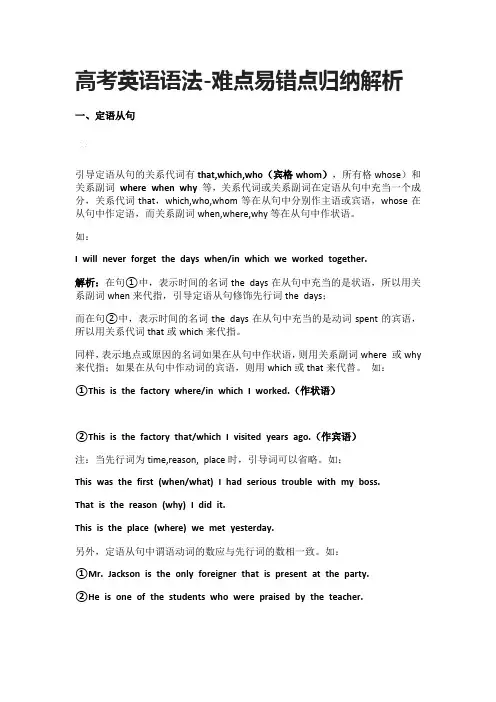
高考英语语法-难点易错点归纳解析一、定语从句引导定语从句的关系代词有that,which,who(宾格whom),所有格whose)和关系副词where when why等,关系代词或关系副词在定语从句中充当一个成分,关系代词that,which,who,whom等在从句中分别作主语或宾语,whose在从句中作定语,而关系副词when,where,why等在从句中作状语。
如:I will never forget the days when/in which we worked together.解析:在句①中,表示时间的名词the days在从句中充当的是状语,所以用关系副词when来代指,引导定语从句修饰先行词the days;而在句②中,表示时间的名词the days在从句中充当的是动词spent的宾语,所以用关系代词that或which来代指。
同样,表示地点或原因的名词如果在从句中作状语,则用关系副词where 或why 来代指;如果在从句中作动词的宾语,则用which或that来代替。
如:①This is the factory where/in which I worked.(作状语)②This is the factory that/which I visited years ago.(作宾语)注:当先行词为time,reason, place时,引导词可以省略。
如:This was the first (when/what) I had serious trouble with my boss.That is the reason (why) I did it.This is the place (where) we met yesterday.另外,定语从句中谓语动词的数应与先行词的数相一致。
如:①Mr.Jackson is the only foreigner that is present at the party.②He is one of the students who were praised by the teacher.解析:在句①中,先行词foreigner被only修饰,强调只有一个,所以从句中谓语动词用单数形式,而在句②中,who引导的定语从句修饰先行词the students,为复数,所以从句谓语动词应为复数。
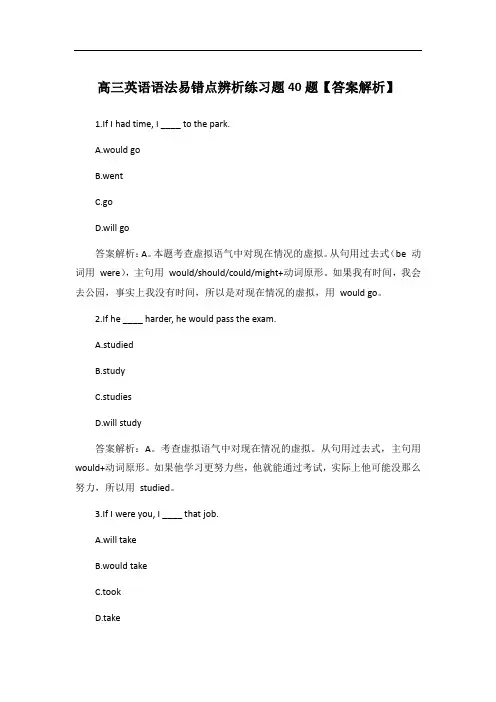
高三英语语法易错点辨析练习题40题【答案解析】1.If I had time, I ____ to the park.A.would goB.wentC.goD.will go答案解析:A。
本题考查虚拟语气中对现在情况的虚拟。
从句用过去式(be 动词用were),主句用would/should/could/might+动词原形。
如果我有时间,我会去公园,事实上我没有时间,所以是对现在情况的虚拟,用would go。
2.If he ____ harder, he would pass the exam.A.studiedB.studyC.studiesD.will study答案解析:A。
考查虚拟语气中对现在情况的虚拟。
从句用过去式,主句用would+动词原形。
如果他学习更努力些,他就能通过考试,实际上他可能没那么努力,所以用studied。
3.If I were you, I ____ that job.A.will takeB.would takeC.tookD.take答案解析:B。
对现在情况的虚拟,从句用were,主句用would+动词原形。
如果我是你,我会接受那份工作。
4.If she ____ more confident, she would speak in public.A.wereB.isC.wasD.be答案解析:A。
对现在情况的虚拟,从句用were,主句用would+动词原形。
如果她更自信些,她会在公共场合发言。
5.If they ____ us, we would have finished the project earlier.A.helpedB.helpC.had helpedD.would help答案解析:C。
考查虚拟语气中对过去情况的虚拟。
从句用had+过去分词,主句用would/should/could/might+have+过去分词。
如果他们帮助了我们,我们会更早完成这个项目,实际上他们没帮,是对过去的虚拟。
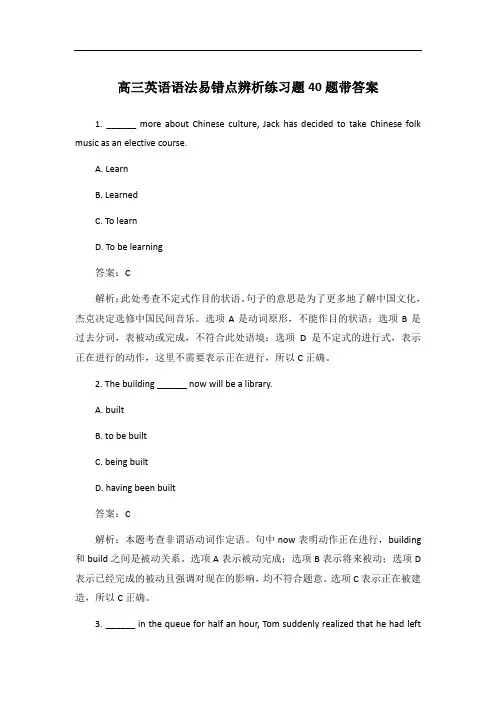
高三英语语法易错点辨析练习题40题带答案1. ______ more about Chinese culture, Jack has decided to take Chinese folk music as an elective course.A. LearnB. LearnedC. To learnD. To be learning答案:C解析:此处考查不定式作目的状语。
句子的意思是为了更多地了解中国文化,杰克决定选修中国民间音乐。
选项A是动词原形,不能作目的状语;选项B是过去分词,表被动或完成,不符合此处语境;选项D是不定式的进行式,表示正在进行的动作,这里不需要表示正在进行,所以C正确。
2. The building ______ now will be a library.A. builtB. to be builtC. being builtD. having been built答案:C解析:本题考查非谓语动词作定语。
句中now表明动作正在进行,building 和build之间是被动关系。
选项A表示被动完成;选项B表示将来被动;选项D 表示已经完成的被动且强调对现在的影响,均不符合题意。
选项C表示正在被建造,所以C正确。
3. ______ in the queue for half an hour, Tom suddenly realized that he had lefthis wallet at home.A. To waitB. Have waitedC. Having waitedD. To have waited答案:C解析:考查现在分词的完成式作状语。
句子的逻辑主语是Tom,Tom和wait 之间是主动关系,并且wait这个动作发生在realized之前,所以要用现在分词的完成式。
选项A是不定式作目的状语,不符合题意;选项B是谓语形式,这里不能用谓语形式;选项D是不定式的完成式,一般不作状语,所以C正确。
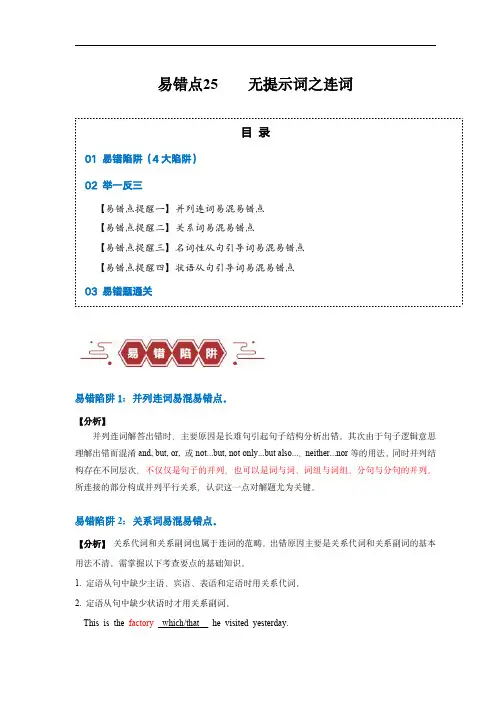
易错点25无提示词之连词目录01易错陷阱(4大陷阱)02举一反三【易错点提醒一】并列连词易混易错点【易错点提醒二】关系词易混易错点【易错点提醒三】名词性从句引导词易混易错点【易错点提醒四】状语从句引导词易混易错点03易错题通关易错陷阱1:并列连词易混易错点。
【分析】并列连词解答出错时,主要原因是长难句引起句子结构分析出错。
其次由于句子逻辑意思理解出错而混淆and,but,or,或not...but,not only...but also...,neither...nor等的用法。
同时并列结构存在不同层次,不仅仅是句子的并列,也可以是词与词、词组与词组、分句与分句的并列。
所连接的部分构成并列平行关系,认识这一点对解题尤为关键。
易错陷阱2:关系词易混易错点。
【分析】关系代词和关系副词也属于连词的范畴。
出错原因主要是关系代词和关系副词的基本用法不清。
需掌握以下考查要点的基础知识。
1.定语从句中缺少主语、宾语、表语和定语时用关系代词。
2.定语从句中缺少状语时才用关系副词。
This is the factory_which/that__he visited yesterday.This is the factory_where/in which he worked last year.3.whose作定语,表示“先行词的...”,后面加名词。
4.介词+which/whom的区别。
5.that与which的区别。
6.as与which的区别。
易错陷阱3:名词性从句引导词易混易错点。
【分析】what引导名词性从句时,在从句中作主语、宾语、表语和定语。
而that引导名词性从句时,在从句中不充当句子成分,但引导主语从句、表语从句和同位语从句时通常不能省略。
易错陷阱4:状语从句引导词易混易错点。
【分析】考生对于常用从属连词一般掌握较好。
但一些特别的词本不属于从属连词,也可以引导时间、条件、原因等状语从句的用法需牢记。
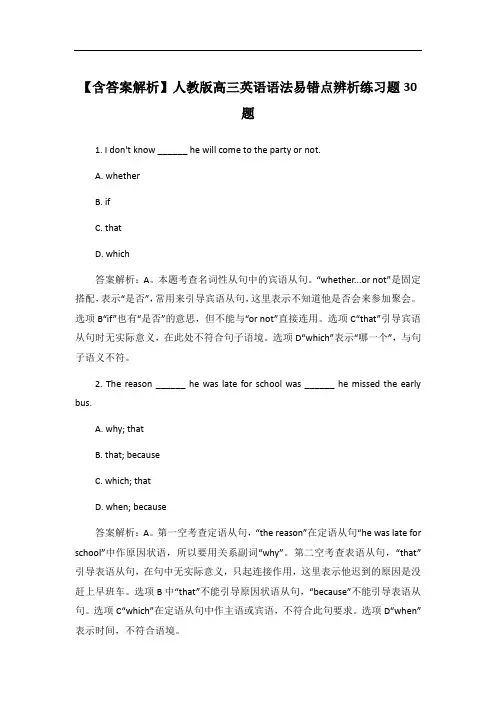
【含答案解析】人教版高三英语语法易错点辨析练习题30题1. I don't know ______ he will come to the party or not.A. whetherB. ifC. thatD. which答案解析:A。
本题考查名词性从句中的宾语从句。
“whether...or not”是固定搭配,表示“是否”,常用来引导宾语从句,这里表示不知道他是否会来参加聚会。
选项B“if”也有“是否”的意思,但不能与“or not”直接连用。
选项C“that”引导宾语从句时无实际意义,在此处不符合句子语境。
选项D“which”表示“哪一个”,与句子语义不符。
2. The reason ______ he was late for school was ______ he missed the early bus.A. why; thatB. that; becauseC. which; thatD. when; because答案解析:A。
第一空考查定语从句,“the reason”在定语从句“he was late for school”中作原因状语,所以要用关系副词“why”。
第二空考查表语从句,“that”引导表语从句,在句中无实际意义,只起连接作用,这里表示他迟到的原因是没赶上早班车。
选项B中“that”不能引导原因状语从句,“because”不能引导表语从句。
选项C“which”在定语从句中作主语或宾语,不符合此句要求。
选项D“when”表示时间,不符合语境。
3. ______ he comes back, I'll tell him the news.A. As soon asB. WhileC. BeforeD. Since答案解析:A。
本题考查状语从句。
“as soon as”表示“一……就……”,在这里表示他一回来,我就告诉他这个消息。
选项B“while”表示“当……的时候”,强调两个动作同时进行,通常用于进行时态。
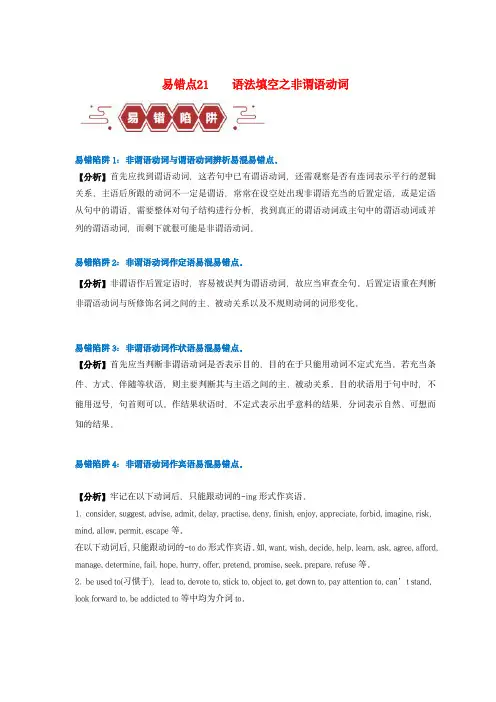
易错点21语法填空之非谓语动词易错陷阱1:非谓语动词与谓语动词辨析易混易错点。
【分析】首先应找到谓语动词,这若句中已有谓语动词,还需观察是否有连词表示平行的逻辑关系。
主语后所跟的动词不一定是谓语,常常在设空处出现非谓语充当的后置定语,或是定语从句中的谓语,需要整体对句子结构进行分析,找到真正的谓语动词或主句中的谓语动词或并列的谓语动词,而剩下就很可能是非谓语动词。
易错陷阱2:非谓语动词作定语易混易错点。
【分析】非谓语作后置定语时,容易被误判为谓语动词,故应当审查全句。
后置定语重在判断非谓语动词与所修饰名词之间的主、被动关系以及不规则动词的词形变化。
易错陷阱3:非谓语动词作状语易混易错点。
【分析】首先应当判断非谓语动词是否表示目的,目的在于只能用动词不定式充当。
若充当条件、方式、伴随等状语,则主要判断其与主语之间的主、被动关系。
目的状语用于句中时,不能用逗号,句首则可以。
作结果状语时,不定式表示出乎意料的结果,分词表示自然、可想而知的结果。
易错陷阱4:非谓语动词作宾语易混易错点。
【分析】牢记在以下动词后,只能跟动词的-ing形式作宾语。
1.consider,suggest,advise,admit,delay,practise,deny,finish,enjoy,appreciate,forbid,imagine,risk, mind,allow,permit,escape等。
在以下动词后,只能跟动词的-to do形式作宾语。
如,want,wish,decide,help,learn,ask,agree,afford, manage,determine,fail,hope,hurry,offer,pretend,promise,seek,prepare,refuse等。
2.be used to(习惯于),lead to,devote to,stick to,object to,get down to,pay attention to,can’t stand, look forward to,be addicted to等中均为介词to。
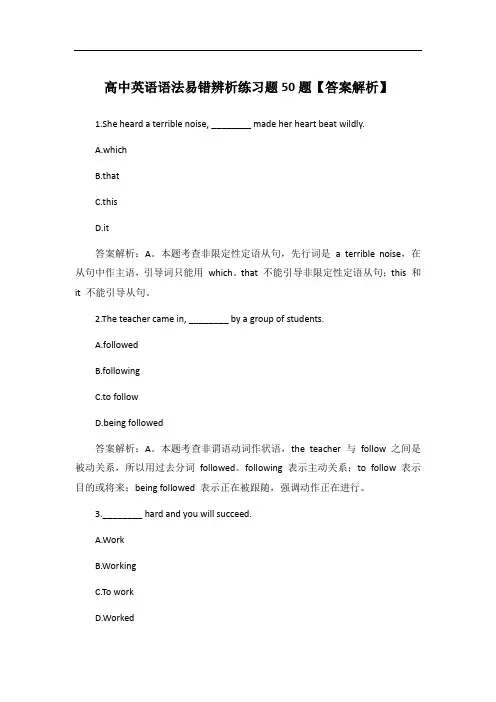
高中英语语法易错辨析练习题50题【答案解析】1.She heard a terrible noise, ________ made her heart beat wildly.A.whichB.thatC.thisD.it答案解析:A。
本题考查非限定性定语从句,先行词是 a terrible noise,在从句中作主语,引导词只能用which。
that 不能引导非限定性定语从句;this 和it 不能引导从句。
2.The teacher came in, ________ by a group of students.A.followedB.followingC.to followD.being followed答案解析:A。
本题考查非谓语动词作状语,the teacher 与follow 之间是被动关系,所以用过去分词followed。
following 表示主动关系;to follow 表示目的或将来;being followed 表示正在被跟随,强调动作正在进行。
3.________ hard and you will succeed.A.WorkB.WorkingC.To workD.Worked答案解析:A。
本题考查“祈使句+and+陈述句”结构,祈使句用动词原形开头。
Working 是现在分词;To work 是动词不定式;Worked 是过去分词,都不符合该结构。
4.The boy sat there, ________ a book.A.readB.readingC.to readD.reads答案解析:B。
本题考查现在分词作伴随状语,the boy 与read 之间是主动关系,所以用现在分词reading。
read 是动词原形,不能作伴随状语;to read 表示目的;reads 是第三人称单数形式,也不能作伴随状语。
5.________ by his words, I decided to study harder.A.InspiredB.InspiringC.To inspireD.Being inspired答案解析:A。
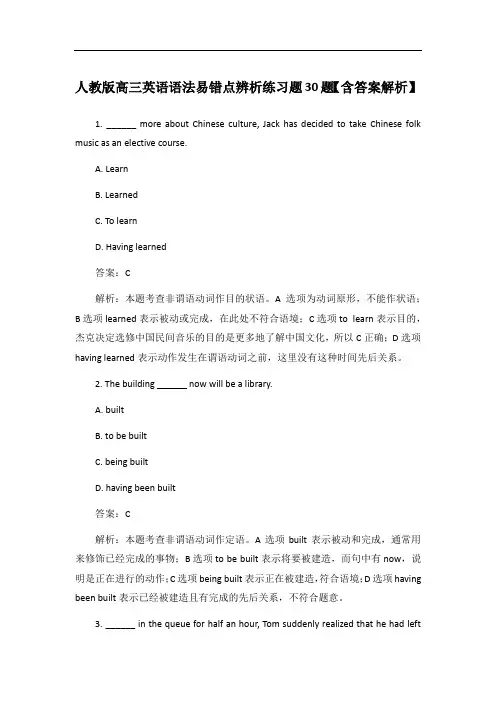
人教版高三英语语法易错点辨析练习题30题【含答案解析】1. ______ more about Chinese culture, Jack has decided to take Chinese folk music as an elective course.A. LearnB. LearnedC. To learnD. Having learned答案:C解析:本题考查非谓语动词作目的状语。
A选项为动词原形,不能作状语;B选项learned表示被动或完成,在此处不符合语境;C选项to learn表示目的,杰克决定选修中国民间音乐的目的是更多地了解中国文化,所以C正确;D选项having learned表示动作发生在谓语动词之前,这里没有这种时间先后关系。
2. The building ______ now will be a library.A. builtB. to be builtC. being builtD. having been built答案:C解析:本题考查非谓语动词作定语。
A选项built表示被动和完成,通常用来修饰已经完成的事物;B选项to be built表示将要被建造,而句中有now,说明是正在进行的动作;C选项being built表示正在被建造,符合语境;D选项having been built表示已经被建造且有完成的先后关系,不符合题意。
3. ______ in the queue for half an hour, Tom suddenly realized that he had lefthis wallet at home.A. To waitB. Have waitedC. Having waitedD. To have waited答案:C解析:本题考查非谓语动词作状语。
A选项to wait表示目的或将来,不符合语境;B选项have waited是谓语动词形式,不能作状语;C选项having waited 表示动作发生在谓语动词realized之前,汤姆排队等了半小时之后才意识到钱包落家里了,所以C正确;D选项to have waited这种形式不用于作状语。
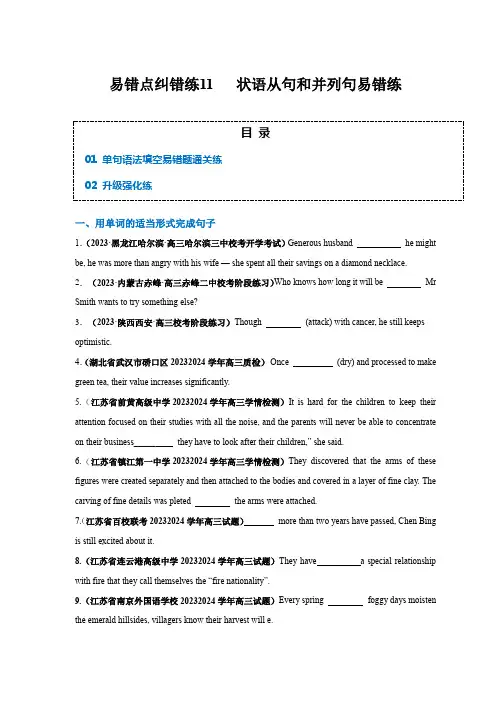
易错点纠错练11 状语从句和并列句易错练目录01 单句语法填空易错题通关练02 升级强化练一、用单词的适当形式完成句子be, he was more than angry with his wife — she spent all their savings on a diamond necklace. 2.(2023·内蒙古赤峰·高三赤峰二中校考阶段练习)Who knows how long it will be Mr Smith wants to try something else?3.(2023·陕西西安·高三校考阶段练习)Though (attack) with cancer, he still keeps optimistic.4.(湖北省武汉市硚口区20232024学年高三质检)Once (dry) and processed to make green tea, their value increases significantly.5.(江苏省前黄高级中学20232024学年高三学情检测)It is hard for the children to keep their attention focused on their studies with all the noise, and the parents will never be able to concentrate on their business_____ they have to look after their children,” she said.6.(江苏省镇江第一中学20232024学年高三学情检测)They discovered that the arms of these figures were created separately and then attached to the bodies and covered in a layer of fine clay. The carving of fine details was pleted the arms were attached.7.(江苏省百校联考20232024学年高三试题)more than two years have passed, Chen Bing is still excited about it.8.(江苏省连云港高级中学20232024学年高三试题)They have a special relationship with fire that they call themselves the “fire nationality”.9.(江苏省南京外国语学校20232024学年高三试题)Every spring foggy days moisten the emerald hillsides, villagers know their harvest will e.10.(2024届辽宁省沈阳市浑南区东北育才学校一模试题)Around every corner and at every turn, there is a new view to store for guests. And then, just they think they have seen it all, a new fountain or landscape pops up.11.(江苏省常熟市20232024学年高三10月抽测试题)“People defend their culture when it is misunderstood or twisted, only through these actions can we have better cultural exchanges between China and the rest of the world.” Tan added.12.(江苏省东台中学20232024学年高三10月试题)Whether you are exploring the streets of Liuzhou______ enjoying a bowl in a distant land, Luosifen is sure to leave a lasting impression on your taste buds, providing a truly unforgettable gastronomic (美食的) experience.13.(江苏省南京市第九中学20232024学年高三质量调研)They kept their collection at home until it got too big _______until they died, and then it was given to a museum.14.(江苏省南京外国语学校20232024学年高三试题)“The tea culture not only reflects a refined taste in life, it also shows the beauty of craftsmanship people’s creativity,” says Zheng Yi, deputy head of Anhui Tea Culture Research Society.15.(江苏省南通市20232024学年高三统考试题)The bronze beast can be seen as a cultural relic nonexistent before not just in China, in the world.16.(20232024学年河北省省级联测高三试题)In Changping District, 30 kilometers north of Beijing, there is a tomb area that covers about 120 square kilometers. The tomb of the Ming Emperor Zhu Di the tombs of the other 12 emperors were built here.17.(河北省20232024学年高三全过程纵向评价试题)In 2005,Cristóbal Minguez, a Spanish, tooka trip to China with his friend. Although it was a brief one, barely two weeks, it would bee a turning point not only in his career, in his life.18.(河北省石家庄市20232024学年石家庄市一中高三试题)If one has lost weight during the summer, then at the beginning of autumn, he she needs to eat many different kinds of delicious food, especially meat.19.(辽宁省重点高中20232024学年高三10月试题)V olunteer travel can help address social and environmental issues, contribute to local development projects help with disaster relief efforts.20.(2023·全国·高三专题练习)On our way to the house, it was raining hard that wecouldn’t help wondering how long it would take to get there.21.(2023·上海·高三专题练习)As a matter of fact, I began playing football I was only eight years old, and I have been good at it.22.(2023·上海·高三专题练习)it is a blind person seeking guidance or an elderly person seeking support, the rail is there for walking.23.(2023·全国·高三专题练习)time went on, the whole forest was almost destroyed. The green hills have gradually changed into a wasteland.23.(2023·全国·高三专题练习)I went to sleep, I browsed through news websites and checked my emails.24.(湖南省雅礼中学20232024学年高三试题)The Losar celebrations e to an end with a grand ceremony. People gather in public spaces and light incense (香) and candles offering food, drinks and other items to the gods.25.(湖南省岳阳市湘阴校联考20232024学年试题)planes and trains brought our world close together, it was the first link that ever connected the East and the West and the life blood of international trade in ancient time.26.(湖北省武汉市硚口区20232024学年高三质检)Geling was once inaccessible as a result of the dense forests, the opening of the Metog highway in 2013 significantly improved connectivity and created opportunities for economic growth.27.(湖北省黄冈市20232024学年高三调研试题)The other was Su Shi. His openminded personality______ diligence for his people left many muchtold tales.28.(湖北省腾云联盟20232024年高三联考试题)The volunteers not only take care of the aged and look after children but also resolve conflicts, Wang noted, adding that if disagreements, quarrels, any other fights occur, “Taiping Women” will be there to help.29.(湖北省宜荆荆恩20232024学年高三起点试题)Whether you are exploring the streets of Liuzhou______ enjoying a bowl in a distant land, Luosifen is sure to leave a lasting impression on your taste buds, providing a truly unforgettable gastronomic (美食的) experience.30.(江苏省20232024学年高三学情调研试题)We should trust life and trust our own abilities to understand what is right and wrong, what decision to make how to solve problems.31.(江苏省镇江市20232024学年高三试题)These poems describe both the historical changes of a dynasty_____ people’ understanding and perception of the world.32.(湖南省邵东市第三中学20232024学年高三试题)Wupeng boats in different spots around the48.My parents are never satisfied I do better than all my friends – in schoolwork, in hobbies, in everything!49.It seemed ages I found out the truth about the accident.50.you e first or last, it is important to remember that at any sporting event, you face two petitors: your fellow petitors and yourself.51.Hungry and tired, I was about to lose my temper the deliveryman appeared with sweat running down his face.52.You should make a response to him you accept the job or not.53.He was inspired by them to go and teach he was needed the most.54.He feels so happy he followed his heart when choosing what to do with his life, even though it may not be what others expected of him.55.The golden fish didn’t grant the fisherman’s wish his wife demanded to be queen of all the land.56.We thoroughly understand each other, even we don’t always agree.57.(广东省江门市新会一中20232024学年高三试题) S tanding on the stage and performing can be tough, ___ when you do it in a group, it can help improve your sense of self as well as increase your confidence.58.(广东省执信中学20232024学年高三开学试题)It is the exact same weight, the longerI hold it, the heavier it bees.”59.(浙江省名校新高考研究联盟)“The virtuous man cherishes a respect for the law, the vile (邪恶的) man cherishes generous treatment. ”60.(浙江省名校协作体20232024学年高三适应性试题)Don’t go to a school specifically for a high school relationship to make someone else happy.二、升级强化练Passage 1(2023·河南郑州·高三郑州市宇华实验学校校考阶段练习)阅读下面短文,在空白处填入1个适当的单词或括号内单词的正确形式。
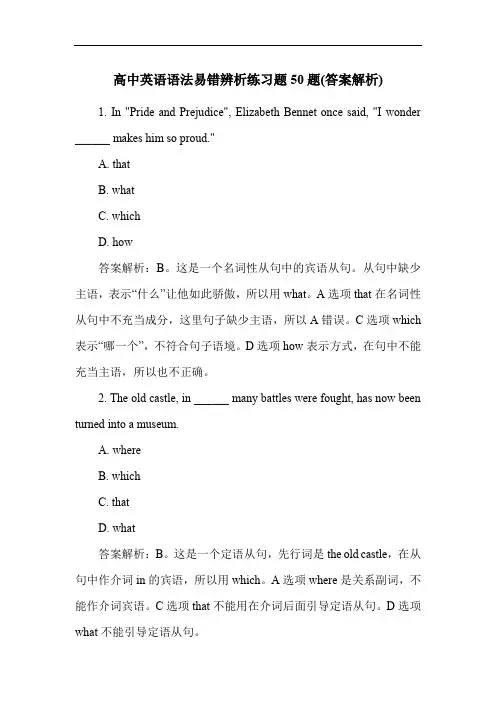
高中英语语法易错辨析练习题50题(答案解析)1. In "Pride and Prejudice", Elizabeth Bennet once said, "I wonder ______ makes him so proud."A. thatB. whatC. whichD. how答案解析:B。
这是一个名词性从句中的宾语从句。
从句中缺少主语,表示“什么”让他如此骄傲,所以用what。
A选项that在名词性从句中不充当成分,这里句子缺少主语,所以A错误。
C选项which 表示“哪一个”,不符合句子语境。
D选项how表示方式,在句中不能充当主语,所以也不正确。
2. The old castle, in ______ many battles were fought, has now been turned into a museum.A. whereB. whichC. thatD. what答案解析:B。
这是一个定语从句,先行词是the old castle,在从句中作介词in的宾语,所以用which。
A选项where是关系副词,不能作介词宾语。
C选项that不能用在介词后面引导定语从句。
D选项what不能引导定语从句。
3. As is described in "Jane Eyre", ______ she was young, she had to endure a lot of hardships.A. whenB. whileC. asD. because答案解析:A。
这里考查状语从句。
when表示“当……时候”,强调在某个时刻或时间段内发生的动作,这里表示当她年轻的时候,她不得不忍受很多苦难。
B选项while强调两个动作同时进行,这里没有这种语境。
C选项as表示“随着”或者“因为”等多种意思,不符合此处语境。
D选项because表示原因,这里不是强调原因,所以错误。
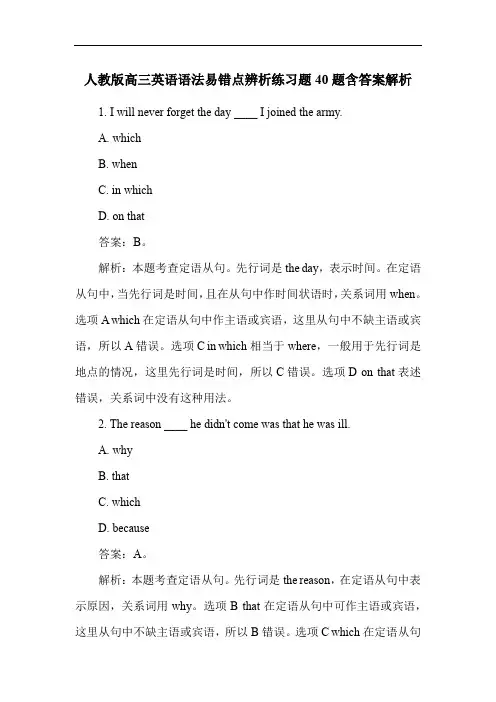
人教版高三英语语法易错点辨析练习题40题含答案解析1. I will never forget the day ____ I joined the army.A. whichB. whenC. in whichD. on that答案:B。
解析:本题考查定语从句。
先行词是the day,表示时间。
在定语从句中,当先行词是时间,且在从句中作时间状语时,关系词用when。
选项A which在定语从句中作主语或宾语,这里从句中不缺主语或宾语,所以A错误。
选项C in which相当于where,一般用于先行词是地点的情况,这里先行词是时间,所以C错误。
选项D on that表述错误,关系词中没有这种用法。
2. The reason ____ he didn't come was that he was ill.A. whyB. thatC. whichD. because答案:A。
解析:本题考查定语从句。
先行词是the reason,在定语从句中表示原因,关系词用why。
选项B that在定语从句中可作主语或宾语,这里从句中不缺主语或宾语,所以B错误。
选项C which在定语从句中作主语或宾语,这里从句中不缺主语或宾语,所以C错误。
选项D because不能用于引导定语从句,所以D错误。
3. He made another wonderful discovery, ____ of great importance to science.A. which I think isB. which I think it isC. which I think itD. I think which is答案:A。
解析:本题考查非限制性定语从句。
which指代先行词discovery,在从句中作主语。
I think是插入语。
选项B中it多余,因为which已经在从句中作主语了。
选项C中缺少谓语动词,句子结构不完整。
1 高中英语语法易错题:交际口语陷阱题 1. “Could you do me a favour and take the box up to the six floor?” “_______.” A. With pleasure B. My pleasure C. No wonder D. No comment 2. “It’s $500, but that is my last offer.” “OK, it is a ________.” A. cost B. price C. reward D. deal 3. “I hear Johnson was badly injured in the accident.” “_______ let’s go and see him.” A. What’s more B. If so C. Where possible D. When necessary 4. “Will you go skiing with me this winter vacation?” “It ______.” A. all depend B. all depends C. is all depended D. is all depending 5. “Do you want to go to the movie, Jane?” “______. I feel like doing something different.” A. Don’t mention it B. I don’t want it C. I don’t think so D. Not really 6. “Would you like me to show you the way?” “_______.” A. That’s very kind of you. B. Yes, you could. C. Good idea! D. With great pleasure! 7. “I prefer a computer made in your company, but I may need some more information about the product.” “_______.” A. Thank you B. It’s a pleasure C. You are welcome D. At your service 8. “Have a drink?” “No thanks, _____.” A. I do mind B. I don’t like it C. Never mind D. I’d rather not 9. “We’ve missed the train!” “_____, there’ll be another in ten minutes.” A. All right B. Not at all C. Never mind D. Don’t mention it 10. “Would you mind telling her the news?” “_____, but I don’t know if I _____ her these 2
days.” A. Of course, shall see B. Of course not, see C. Of course, see D. Of course not, shall see 11. “May I borrow your paper?” “ ______.” A. By all means B. Never mind C. You are welcome D. Don’t mention it 12. He pushed his way through the crowd, saying “_____.” A. Never mind B. With pleasure C. Go ahead D. Excuse me 13. “Here’s what you asked for.” “______.” A. Many thanks B. Thank a lot C. Thanks you D. Thank you a lot 14. “Can you spare me a few minutes now?” “______, but I’ll be free this afternoon.” A. No, I won’t B. Yes, with pleasure C. I’m not sure D. I’m afraid not 15. “Would you like to turn that music down? I’m writing a letter.” “_____.” A. No, I’d like to B. No, please C. Yes, sorry. D. Yes, I’d like it. 16. “You must find such long hours very tiring.” “______. I enjoyed it.” A. After all B. Never mind C. Not in the least D. That’s all right 17. “Would you take this along to the office for me?” “_____.” A. That’s right B. With pleasure C. Never mind D. Not at all 18. “Do you need any help with those heavy bags?” “No, thanks; _____.” A. Never mind B. All right C. I can manage D. You are welcome 19. “Mr Smith is a kind person. I like to to work with him.” “In fact, everyone _______.” A. is B. does C. has D. likes 3
20. “At lunch time I’d like to have a chat with you.” “Pardon, Have _____ with me?” A. when B. who C. which D. what 21. “I think you should phone Jenny and say sorry to her.” “______. It was her fault.” A. No way B. Not possible C. No chance D. Not at all
4
答案与解析 1. 选 A。with pleasure 的意思是“高兴地”、“乐意地”。注意不宜选B,my pleasure 主要用于回答感谢,意为“这是我乐意做的事”、“不用客气”,也可说成 It’s my pleasure 或 It’s a pleasure等。 2. 选D。It’s a deal 的意思是“就这么办”、“一言为定”。 3. 选B。if so 为 if it is so 之略,意为“如果那样的话”。 4. 选B。It all depends 的意思是“那要看情况”,也可说成 That depends。 5. 选D。not really 表示否定,但语气较轻,意为“不很……”。 6. 选A。That’s very kind of you 意为“你太好了”、“你真是太客气”,常用于感谢对方的友好提议。又如下面一题也选A: 7. 选D。at your service 的意思是“随时为您服务”、“随时为您效劳”。 8. 选D。I’d rather not 通常用于委婉地拒绝对方的邀请或提议。 9. 选C。never mind 表示安慰,意为“不要紧”、“没关系”。 10. 选D。第一空填 of course not,表示“不介意”;第二空要填 shall see,因为 if 引导的是宾语从句,而不是条件状语从句,所以不能用一般现在时表示将来。 11. 选A。by all means 表示同意,意为“完全可以”。 12. 选D。excuse me 用作从别人面前经过时的礼貌用语,又如:Excuse me, could I get past? 对不起,让我过去好吗? 13. 选A。若选B,则应改为Thanks a lot;若选C,则应改为 Thank you 或 Thanks;若选D,则应改为 Thank you very much 之类的。换句话说,thank 用作动词时,它是及物的,其后应有宾语;用作名词时,它通常要用复数形式。另外注意,英语中虽然可说 Thanks a lot,但习惯上不说 Thank you a lot。 14. 选D。甲要乙现在抽出几分钟,而乙说要等下午才有空——也就是说,乙现在抽不出时间,所以选D最适合。 15. 选C。从上下文语境来看,一方因音乐声放得太大已对另一方(正在写信)造成影响,所以选C较恰当。 16. 选C。Not in the least 意为“一点也不”。注意联系下文的 I enjoyed it。 17. 选B,with pleasure 主要用于回答请求或邀请。 18. 选C。由句意推知。 19. 选B。does 相当于 likes to work with him。注意不能选D,因为 like 是及物动词。